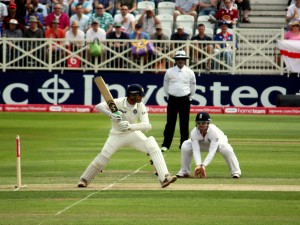Staying in the game
Friday, March 30th, 2012I’d like to know what was going through Mahela Jayawardene’s head when he was given the captaincy of his country for the second time around in January.
Anyone who heard Kumar Sangakkara’s Spirit of Cricket speech last July knows Sri Lankan cricket has been in turmoil for some time now. The mess it’s gotten into hasn’t been as dramatic as that of West Indies cricket, but it’s been an unsavoury tale of internecine bickering, political interference and withheld payments. At one stage the ICC even had to step in to pay the cricketers, since the World Cup team haven’t been paid since last April.
If any of this gave Jayawardene a sinking feeling of “here we go again,” or even, in the words of Danny Glover in the Lethal Weapon movies, “I’m getting too old for this shit,” he hasn’t said. But since he’s regained the captaincy Sri Lanka have played positive, fighting cricket. Tillakaratne Dilshan found the captaincy crown an ill-fitting, weighty burden. He and his batting struggled under it; every time he went out to the middle he seemed to have storm clouds wreathed around his brow. He looked, as PG Wodehouse once wrote, like a man who has searched for the leak in life’s gaspipe with a candle. If ever there was the definition of a reluctant leader, Dilshan was it.
Mahela is cut from a different cloth; he doesn’t suffer fools but at the same time is his team’s even-tempered axis. Though it helps he has experience where this particular gig is concerned, leading by example seems a straightforward, reasonable requirement for the job as far as he’s concerned. When your country calls, you answer. The first Test at Galle in this series against England has been a masterclass of leadership and personal achievement. The prospect of failure becomes no longer an insurmountable obstacle to be crumbled before, but a challenge.
There was never the outright suggestion in the various previews that Sri Lanka would be a pushover for England after their UAE drubbing, but the many comparisons between the bowling attacks of Pakistan and Sri Lanka tended not to flatter Mahela’s men. After England were bowled out yesterday attempting an historic run chase of 340, it’s clear that what we were mostly guilty of was a gross underestimation of England’s ability to learn from their mistakes. The beatings will continue until morale improves. Or not.
Jayawardene may no longer have a Murali to turn to, but the last four days have shown that honest workman-like spin can trouble England just as well. Granted, the wicket was not quite as benign as some would have had us believe, but help for the spinners was more apparent during England’s second innings when they ironically made a better fist of things than in their first, when they were all out for 193 in under 47 overs. Their second innings was at least propped up by a magnificent century by Jonathan Trott – the slowest of his seven Test hundreds, the pacing of which was absolutely necessary – but their first was a baffling, kamikaze rush to disaster; if there was one consolation in seeing England batsmen give their wickets away through a slavish insistence on the sweep and a lemming-like urge towards self-annihilation, it was that at least they seemed in a hurry to put us all out of our misery.
Trott (along with Matt Prior and Ian Bell in supporting roles) aside, if England’s batsmen needed a masterclass on how to build an innings, Mahela Jayawardene provided them with a blueprint. The Baroque flourishes of Dilshan and other pyrotechnicians are not for him; his is a more Palladian architecture, with an adherence to first principles: balance, solidity, adaptability. Ornamentation and exuberance come after, when the edifice is sound. His batting is all clean lines, elegant simplicity, form through function. He came to the middle when Sri Lanka were in dire straits at 11-2, and on the rocks at 15-3; from then on it was a case of standing firm against the storm and keeping his side in the game with a magnificent 180. Of course, it’s not the first time he’s done this. His 115 against New Zealand in the 2007 World Cup – in which he started his innings with watchful circumspection and ended up pasting Shane Bond all round Sabina Park – is a particular standout. In Tests, he now averages 89.64 against England at home.
The components of England’s loss look unfortunate in isolation but disastrous when taken as a catalogue of mishaps, pratfalls and heat-addled shot selection. Mahela was dropped four times, Broad’s front-foot no-ball was revealed with tragicomic timing after the team had riotously celebrated bowling Sri Lanka out, and even England’s second innings seesawed repeatedly between hope and bathos as Jonathan Trott’s marathon innings was punctuated increasingly by his partners at the other end falling by the wayside through their own ineptitude – a Homeric epic interrupted constantly by advert breaks for double-glazing featuring second-rate comedians.
England must win in Colombo if they are to retain their number one Test status. The most worrying thing about this run of Test failures – four on the bounce now – is that while it’s tempting to look forward to a happier summer when England play the West Indies in May, the confidence of some players might be so shot by then, and the pressure on them to justify their selection so overwhelming, that Devendra Bishoo and Sunil Narine may end up causing them a very big headache indeed. After being put through the wringer in the UAE and Sri Lanka, it might just be a case of one spin cycle too many for England’s batting delicates.
